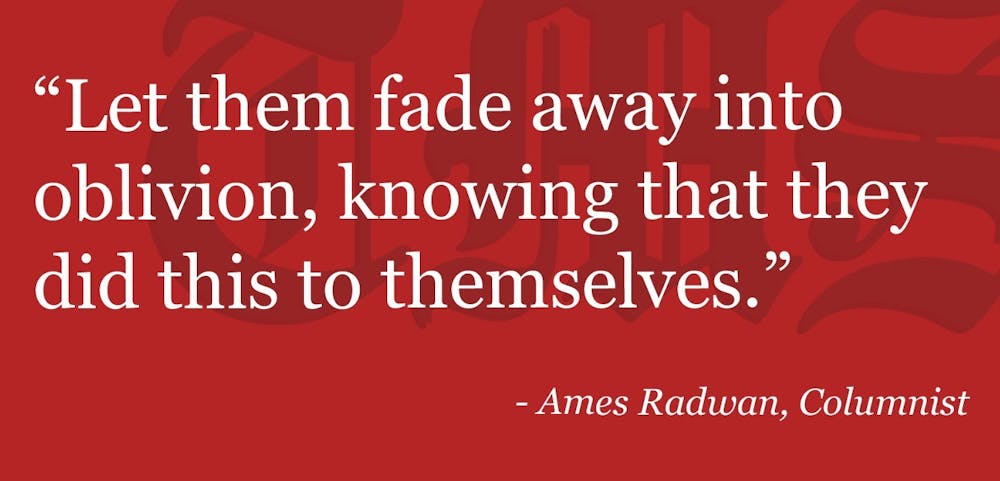Let’s talk about sexual assault.
It’s a topic that often very few people are comfortable broaching. But nevertheless, one that has shown up over and over again in The Miami Student and in social media lately, particularly the Miami kind.
Among other reasons, this was because Miami’s Lecture Series planned to host a certain creator (who shall not be named due to the entire point of this article), who has a past of sexual misconduct and once engaged in a skit that depicted a rape of a baby doll.
The lecture in question was canceled, and as recently as last week, The Student ran multiple articles on the matter. This included a news story on the cancellation, as well as an editorial on why the creator should never have been invited to Miami in the first place. There was even an episode of The Miami Student’s news podcast, “This Week @ TMS.”
I personally read all of these articles, and they got me thinking about how I wanted to write an opinion piece of my own on the matter.
The newly founded student organization, Sexual Assault Survivor Support (SASS), had originally scheduled a protest against the creator’s participation in the Lecture Series. As a member of SASS myself, when the lecture was canceled, I fully expected the protest to end before it had even begun.
However, the protest was still on. As first-year student and marketing/promotions chair Taylor Beasley sent in the SASS GroupMe chat, “Although we are happy that the lecture has been canceled, it has been advertised as a scheduling issue rather than response to student advocacy. We will continue to fight for Lecture Series committee policy reform.”
I couldn’t attend the protest because of a scheduling conflict, but intrigued and thinking I could perhaps write an opinion article on my approval towards the protest, I reached out to sophomore psychology major and SASS President Josie Carter to ask her a couple of questions.
Her response shocked me, in a good way.
“I’m fine with answering questions,” she replied to me. “But I honestly am tired of giving [the creator] continuous attention. We still had the protest because it’s a bigger issue than just a problematic speaker. The protest was to go against the continuous victim blaming narrative and rape culture here at Miami.”
To be honest, I had never thought of it in that manner. Of course I had always focused on the assaulters themselves, rather than their victims — isn’t it important to get these monsters the retribution they deserve?
Isn’t it important to see famous folk such as actors, singers and movie and music producers, originally thought to be untouchable, end up fired or jailed for their previous sexual assaults or harassments? Isn’t that why movements such as #MeToo exist?
Enjoy what you're reading?
Signup for our newsletter
All of that is important, of course. But I never thought of it in this way until Josie explained it to me. Essentially, the more we focus on those who committed the sexual assault, the more attention they get.
There’s that old saying that “There’s no such thing as bad publicity,” and while I think sexual harassment or assault allegations are probably the worst publicity one could ever get, there’s still the fact that talking about the perpetrator is still giving them attention, even if it’s negative.
Hence why I’m not mentioning the man’s name.
I think it’s admirable that our society so desperately wants to bring justice to these criminals, and I definitely don’t think we should stop that! But maybe once this justice is served, it would be beneficial for us to stop talking about them.
To stop giving them attention they don’t deserve.
Let them fade away into oblivion, knowing that they did this to themselves.
Instead, let us focus on the survivors. Theirs are the names we need to talk about, the people we need to uplift.
Megan Ganz, for instance, a former writer on the popular TV sitcom “Community” who was sexually harassed during her time writing for the show by its creator who was invited for the Lecture Series.
One of the biggest issues surrounding sexual and interpersonal violence, especially on social media, is that we are willing to name-drop those who have done bad things but not so willing to elevate the names of survivors. These are the true heroes of the situation — the people who have walked through fire and come out the other side.
It’s the same thing for serial killers and their victims. Think of the most famous serial killer you know … now name three of their victims. You can’t do it, right?
That needs to change. Say their names. Be there for them.
Megan Ganz.




